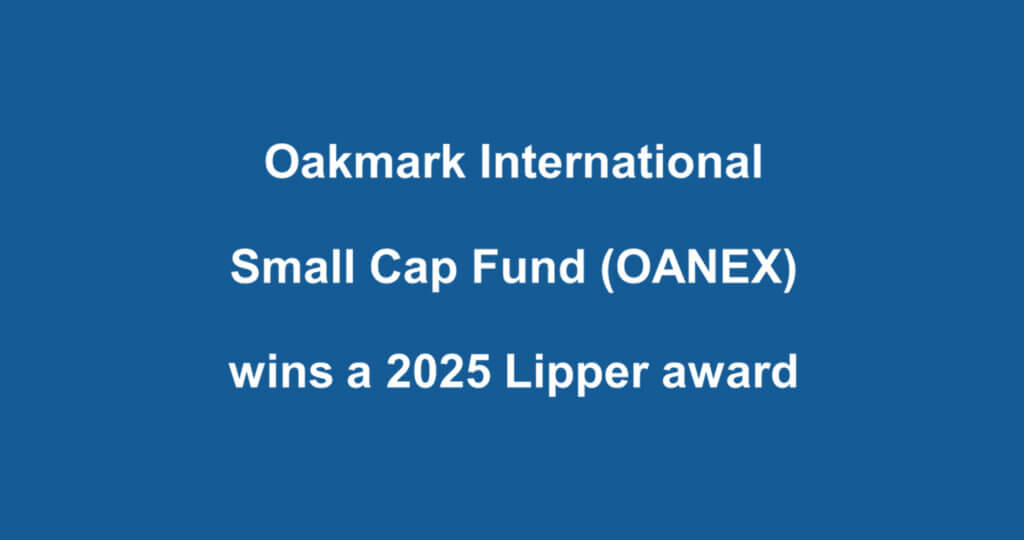By David Herro, Portfolio Manager
Key takeaways:
- Because we focus on bottom-up stock selection, geographic exposures are simply a result of our process. However, if we had to identify a region of opportunity, it would be Europe.
- Within Europe, three themes have emerged: blue-chip European banks, agricultural technology and global travel-related businesses.
- We are having difficulty finding value in Japan, but are seeing pockets of opportunity in China.
While our investment philosophy and process focus on stock selection, we are often asked about our specific geographic exposures and why we may be overweight certain regions and underweight others. Where a company has its headquarters is of little importance to us as we focus on where and how it generates cash flow and how that cash flow is used. In short, country and industry weights are literally a fallout of our stock selection. We search for businesses that meet our value criteria of being low in price using standard valuation metrics while being high in quality—defined by businesses that earn high returns and have good cash flow generation through time. That being said, there are some specific regions and themes of note.
Europe
In the last few years, we have been able to find great value in European businesses as their share prices have been weak, while corporate performance has been more than acceptable. If you look at Germany as an example, despite the less than robust economic situation, most businesses are global in nature and are growing earnings. Meanwhile, Germany’s main stock index trades at just over 10x next year’s earnings. Keep in mind that at the close of the quarter, the German 10-year bond yielded 2.7%, helped by a relatively strong fiscal situation. If you look at the earning yield of close to 10% less the 10-year bond yield, there is a greater than 7% spread between the two. A similar figure for the U.S. would be around a 1% spread given much higher 10-year rates in the U.S. combined with a significantly lower earnings yield on the S&P 500 Total Return Index of just 5.5%. In short, as value investors, Europe provides a fertile hunting ground.
Within Europe, a theme we like is blue-chip European banks, which are selling at depressed valuations after a decade of near-zero interest rates hurt their profitability. Recent U.S. bank failures spooked investors who believed that European banks could face a wave of insolvency due to shaky loans and investments. But European banks tend to be safer and more conservative than their U.S. counterparts. The rapid rise in European interest rates should improve these banks’ profitability and dividend yields. An example is BNP Paribas, which is the largest publicly traded bank in France. With operations in about 80 countries, it plans to become a U.S.-style full-service global investment bank. Last year, it completed the acquisition of Deutsche Bank’s global prime brokerage and electronic equities units.
Europe also affords us the opportunity to invest in agricultural technology. CNH Industrial of Italy is a manufacturer of agricultural and construction equipment. The company’s pioneering technology, Precision Technology Solutions, is helping drive productivity for its customers in key areas of automation, autonomy and connected platforms. Germany’s Bayer spends more than 2 billion euros a year in its crop science division to drive an innovation pipeline to help secure sufficient supply of quality food to meet the demands of a population forecasted by the UN to grow by over 2.2 billion people.
Another theme that fits our value style is driven by the rebound in global travel. International travel reached 80% of pre-pandemic levels in the first quarter of 2023. The return of Chinese tourists to destinations worldwide should top off a robust revival of global tourism. One example is Amadeus IT Group. Although not as well-known as its competitors, Expedia and Booking Holdings (formerly Priceline.com), this Madrid-based travel-software specialist is the leading supplier of booking data to travel agencies and corporations around the world. It also provides specialized commercial software for airlines. Another example is Ryanair Holdings. The Irish airlines uses a no-frills business model for short-haul routes between secondary airports throughout Europe. And when passengers arrive, they often stay at Accor, the franchiser and manager of internationally acclaimed luxury and premium hotels.
China
In the mid-2000s, we were often asked why we didn’t own more of the BRIC (Brazil, Russia, India and China) countries in our portfolios. I wrote about being unable to find value in any of the BRICs because of poor valuation and/or terrible corporate governance. The presence of economic growth and vibrancy does not necessarily coincide with undervalued securities that meet our rigorous criteria. Today, we exclude Russia completely from our investible universe and we are being asked if China is even investible.
Though we certainly recognize China has issues, most of which have been self-inflicted, we don’t believe the market is un-investable given the current situation. It’s true foreign companies have cut way back on direct investment as they de-risk supply chains, but China, as the world’s second largest economy and is still emerging, is both an important market as well as a large center for manufacturing. Automakers like, Mercedes-Benz Group and Bayerische Motoren Werke (BMW), generate about a third of their business from Asia, primarily China. Despite this exposure, we are getting the same story in meetings with German automakers: business is holding up and they expect profits will increase over time. The companies are being disciplined to not chase volume over value, a key learning from the pandemic. In addition, the electric vehicles they have been developing over the last decade are in full swing; BMW has a new class coming out in 2024-2025 so there is cautious optimism. Plus, they trade at three times cash flow, have large cash balances and are buying back stock.
Also, the regulatory pressure on Chinese tech companies appears to have peaked removing some of the uncertainty in this important part of the Chinese economy. While the regulation has made it easier for competitors, it also afforded us an opportunity to own shares of Alibaba Group at a fraction of the level of an average business. We always thought Alibaba’s 40% market share wasn’t sustainable. Now, with the government’s help, the market share decline came a bit quicker, but market share and profitability haven’t collapsed given its technology and scale advantages. We believe Alibaba’s plans to spin off business will help bring visibility into its inherent value.
Besides the geopolitical situation, which we try to reflect by using higher risk premiums for Chinese stocks, there is the financial situation given the debt build up within the public and property sectors. We do believe this is an issue, but especially given the high saving rates, trade surpluses and large stock of foreign reserves in China, the situation can be handled. Given these risks, we are cognizant of the overall weighting of Chinese companies in our portfolios to serve as an additional layer of risk management.
Japan
Meanwhile, we are frequently asked—why the large underweight in Japan? Quite simply, again given valuations, it’s a harder geography to find businesses that meet our criteria. The Japanese market trades at around 14x earnings, but the average return on equity (ROE) of a Japanese company is just 8%. The European market on the other hand trades at 11x earnings and 10x next year’s, but provides a 15% ROE. It’s true, corporate performance is slowly improving in Japan, but at such low levels of economic return prevalent throughout corporate Japan, it’s hard to find widespread value. This wasn’t always the case. Our allocation to Japanese equities hit an all-time high in 2011. The market became replete with opportunities as the market viewed Japan as a classic value trap given flat economic growth since the 1990s. However, we drew parallels to the Asian economic crisis in the late 1990s, when bleak sentiment overshadowed great businesses that thrived during the powerful emerging markets bull market. In both instances, our conviction was eventually rewarded.
In summary
We aren’t looking at regions or geography as driving factors for investment, but rather the attributes and opportunities of individual stocks per our research and analysis. We happen to be finding value in Europe right now, but overall, given the combination of low company valuation and respectable growth in corporate cash flow streams of our owned investments, we are pleased with our portfolio positioning and are enthused about prospects.
OPINION PIECE. PLEASE SEE ENDNOTES FOR IMPORTANT DISCLOSURES.
The securities mentioned above comprise the following preliminary percentages of the Oakmark International Fund’s total net assets as of 09/30/2023: Accor 1.7%, Alibaba Group 1.7%, Amadeus IT Group 1.4%, Bayer 2.6%, BMW ADR 2.2%, BNP Paribas 3.2%, Booking Holdings 0%, CNH Industrial 2.8%, Expedia 0%, Mercedes-Benz Group 2.8% and Ryanair Holdings ADR 1.8%. Portfolio holdings are subject to change without notice and are not intended as recommendations of individual stocks.
Access the full list of holdings for the Oakmark International Fund here.
The securities mentioned above comprise the following preliminary percentages of the Oakmark International Small Cap Fund’s total net assets as of 09/30/2023: Accor 0%, Alibaba Group 0%, Amadeus IT Group 0%, Bayer 0%, BMW ADR 0%, BNP Paribas 0%, Booking Holdings 0%, CNH Industrial 0%, Expedia Group 0%, Mercedes-Benz Group 0% and Ryanair Holdings ADR 0%. Portfolio holdings are subject to change without notice and are not intended as recommendations of individual stocks.
Access the full list of holdings for the Oakmark International Small Cap Fund here.
The securities mentioned above comprise the following preliminary percentages of the Oakmark Global Fund’s total net assets as of 09/30/2023: Accor 0%, Alibaba Group 2.2%, Amadeus IT Group 0%, Bayer 3.1%, BMW ADR 0%, BNP Paribas 0%, Booking Holdings 0%, CNH Industrial 3.3%, Expedia Group 0%, Mercedes-Benz Group 3.6% and Ryanair Holdings ADR 2.1%. Portfolio holdings are subject to change without notice and are not intended as recommendations of individual stocks.
Access the full list of holdings for the Oakmark Global Fund here.
The securities mentioned above comprise the following preliminary percentages of the Oakmark Global Select Fund’s total net assets as of 09/30/2023: Accor 0%, Alibaba Group 2.9%, Amadeus IT Group 0%, Bayer 4.6%, BMW ADR 0%, BNP Paribas 0%, Booking Holdings 0%, CNH Industrial 4.2%, Expedia Group 0%, Mercedes-Benz Group 4.6% and Ryanair Holdings ADR 0%. Portfolio holdings are subject to change without notice and are not intended as recommendations of individual stocks.
Access the full list of holdings for the Oakmark Global Select Fund here.
The information, data, analyses, and opinions presented herein (including current investment themes, the portfolio managers’ research and investment process, and portfolio characteristics) are for informational purposes only and represent the investments and views of the portfolio managers and Harris Associates L.P. as of the date written and are subject to change and may change based on market and other conditions and without notice. This content is not a recommendation of or an offer to buy or sell a security and is not warranted to be correct, complete or accurate.
Certain comments herein are based on current expectations and are considered “forward-looking statements.” These forward looking statements reflect assumptions and analyses made by the portfolio managers and Harris Associates L.P. based on their experience and perception of historical trends, current conditions, expected future developments, and other factors they believe are relevant. Actual future results are subject to a number of investment and other risks and may prove to be different from expectations. Readers are cautioned not to place undue reliance on the forward-looking statements.
The S&P 500 Total Return Index is a float-adjusted, capitalization-weighted index of 500 U.S. large-capitalization stocks representing all major industries. It is a widely recognized index of broad, U.S. equity market performance. Returns reflect the reinvestment of dividends. This index is unmanaged and investors cannot invest directly in this index.
The funds’ portfolios tend to be invested in a relatively small number of stocks. As a result, the appreciation or depreciation of any one security held by the Fund will have a greater impact on the Funds’ net asset value than it would if the Fund invested in a larger number of securities. Although that strategy has the potential to generate attractive returns over time, it also increases the Funds’ volatility.
The stocks of smaller companies often involve more risk than the stocks of larger companies. Stocks of small companies tend to be more volatile and have a smaller public market than stocks of larger companies. Small companies may have a shorter history of operations than larger companies, may not have as great an ability to raise additional capital and may have a less diversified product line, making them more susceptible to market pressure.
Investing in foreign securities presents risks that in some ways may be greater than U.S. investments. Those risks include: currency fluctuation; different regulation, accounting standards, trading practices and levels of available information; generally higher transaction costs; and political risks.
All information provided is as of 09/30/2023 unless otherwise specified.







